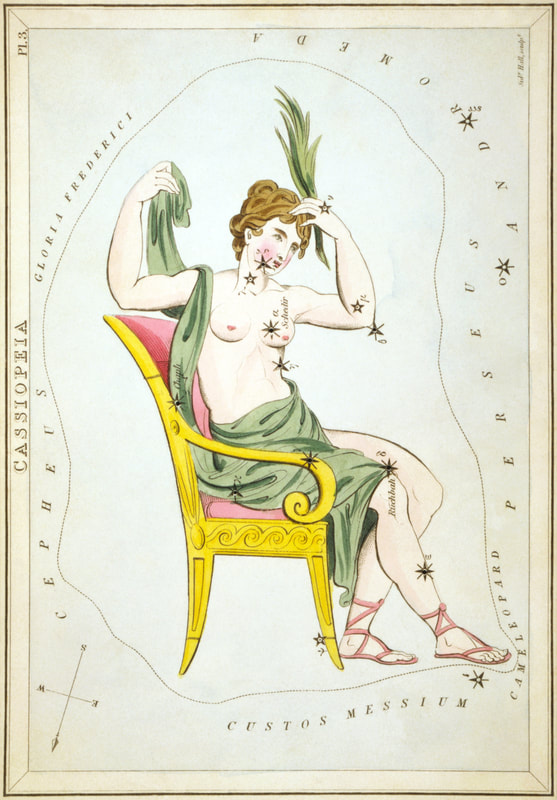QUEEN CASSIOPEIA IN GREEK MYTHOLOGY
Cassiopeia is a reoccurring name in Greek mythology, although in most cases, it is a name attributed to minor figures. There is though one figure more famous than the other, a mortal queen who appeared in the myth of Perseus, a Queen of Aethiopia, and a figure who's likeness appears in the night sky.
Cassiopeia Queen of Aethiopia
|
Cassiopeia was the Queen of Aethiopia, the land that stretched across Africa, south of Libya' Cassiopeia being queen as she was married to Cepheus, a son of Belus.
The parentage of Cassiopeia is more difficult to differentiate, though most often, but still rarely, Cassiopeia is considered to be a daughter of the Oceanid Zeuxo, possibly by Coronus. Nonnus, in the Dionysiaca, called her a nymph, though this does not equate with her being called a mortal queen. Certainly though Cassiopeia had the beauty of a nymph, most likely inherited from Zeuxo, and these genes were passed on to Cassiopeia and Cepheus' daughter Andromeda. |
The Hubris of Cassiopeia
|
Cassiopeia recognised that she, and Andromeda, were beautiful but in an act of hubris, Cassiopeia would claim that their beauty surpassed even that that of the Nereids. The Nereid nymphs promptly complained en masse to the Greek god Poseidon.
Poseidon was forced to punish Cassiopeia, and this he did by sending down a flood upon Aethiopia, and then also sent a sea monster, the Aethiopian Cetus, to ravage the country. Cepheus and Cassiopeia would seek guidance from the seer Ammon, who provided news that only by sacrificing Andromeda to the Cetus would Aethiopia be free from its torment. Cepheus' subjects would force the King of Aethiopia to act upon the proclamation, and so Andromeda was chained to rocks as a sacrifice to the sea monster. Andromeda of course did not die, for Perseus passed through Aethiopia after killing Medusa, and he used the head of the Gorgon, to turn the Aethiopian Cetus to stone. The Constellation CassiopeiaSome say that immediately afterwards Poseidon decided upon a new punishment for Cassiopeia, tying her upon a throne, which was then placed upside down in the night sky. Other say that this was not punishment, but that the likeness of Cassiopeia was placed amongst the stars, alongside Perseus, Andromeda and Cepheus as a remembrance of the adventures of Perseus.
|
|
|
|
Colin Quartermain - Cassiopeia - 8th September 2019
